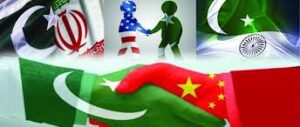Newspaper Article 03/08/2018

With a new government to take office soon, it is hoped that finally some importance will be given to Pakistan’s foreign policy. Presently, the country’s economy does not portray a pretty picture, and while the security situation has improved, threats still exist. However, on the foreign policy front, the pace has been slow, and the country has not been able to make any headway, both regionally, and beyond.
The political party with the majority vote was confirmed as the Pakistan Tehreek-e-Insaf (PTI), which contested the election on the promise to end corruption. The people’s choice to vote for an honest leader proved that they were tired of this evil, and the damage it has had on society, and want to be liberated from the corrupt practices and lineage-oriented system prevalent in our politics. Imran Khan, the expected new prime minister of Pakistan, is not from a traditionally political family, which shows that dynastic politics is slowly being weeded out. This is a positive trend, and a progressive march towards merit-oriented politics.
Pakistan is currently facing challenges on several fronts. Regionally, the hostile intra-state relations, coupled with terrorism, have antagonized the security environment. The situation in Afghanistan and the long-standing conflict with India are the prime reasons behind this situation. On the international front, circumstances are no better, with the US blaming Pakistan for harbouring terrorists, and both countries growing further apart, due to the rising influence of China on Islamabad.
In this backdrop, a country’s foreign and security policies should be aligned with the prevailing trends, and should be devised concurrently for the best possible result. However, there will be times when each one would have to take the lead, depending on the prevalent circumstances in the country. During times of peace, foreign policy, with regards to diplomacy and effective communication will be employed, while during times of conflict, security policies will have precedence. In the end, both can work in Pakistan’s favour and help project a positive image, as well as act as an effective counter narrative, for domestic, regional and international audiences.
Recently, the China Pakistan Economic Corridor (CPEC) has been a popular subject, and is considered an opportunity for regional connectivity, with Pakistan’s Gwadar port central to its progress. However, this incredible opportunity cannot be utilised without first ensuring regional peace. In this regard, relations with India, Iran and Afghanistan need to be improved. Pakistan shares a 900-kilometre long border with Iran; despite religious and cultural similarities, we are yet to develop a sustainable partnership with them. A similar state of affairs exists in regard to Pakistan’s relationship with Afghanistan; however, Imran Khan, in his first address to the nation, assured the public that he would do everything in his power to improve the current conditions.
Relations with India have been hostile for quite some time, as both view the other from the prism of partition. However, the challenge facing Pakistan is to brush aside the differences between the two states, and move forward into an era of bilateral cooperation. This can be achieved through trade, uniting against extremist forces in the region, and an exchange of art, culture and people. India should also be urged to revaluate their decision over CPEC, as the geo-economic benefits linked with this colossal project would benefit everybody in the region.
Consequently, the new government is in for a tough time in order to adjust to regional and global developments. While they are expected to face challenges over the next few months, there exist opportunities as well. If they can take advantage of the possibilities available to them, then they might manage to guide Pakistan’s foreign policy in the right direction.
{Disclaimer the views expressed in the article are of the author and do not necessarily reflect the Institutes policies}

